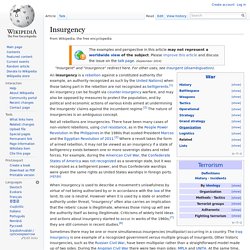

Insurgency. An insurgency is a rebellion against a constituted authority (for example, an authority recognized as such by the United Nations) when those taking part in the rebellion are not recognized as belligerents.[1] An insurgency can be fought via counter-insurgency warfare, and may also be opposed by measures to protect the population, and by political and economic actions of various kinds aimed at undermining the insurgents' claims against the incumbent regime.[2] The nature of insurgencies is an ambiguous concept.

Not all rebellions are insurgencies. There have been many cases of non-violent rebellions, using civil resistance, as in the People Power Revolution in the Philippines in the 1980s that ousted President Marcos and the Egyptian Revolution of 2011.[3] Where a revolt takes the form of armed rebellion, it may not be viewed as an insurgency if a state of belligerency exists between one or more sovereign states and rebel forces. Definition[edit] Tactics[edit]
Joint Chiefs of Staff Official Web Site. Martin Dempsey. Early life and education[edit] Career[edit] On March 27, 2007, Dempsey was promoted from commander of Multi-National Security Transition Command-Iraq, to be reappointed as a lieutenant general and assigned as deputy commander of U.S.

Central Command, MacDill Air Force Base, Florida. Welcome to the National Security Agency. Danger Room - What's Next in National Security. Home. National Defense Magazine.